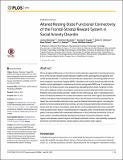Altered Resting-State Functional Connectivity of the Frontal-Striatal Reward System in Social Anxiety Disorder
Author(s)
Reynolds, Gretchen; Saygin, Zeynep M.; Hofmann, Stefan G.; Pollack, Mark; Gabrieli, John D. E.; Manning, Joshua Brandon; Gabrieli, Susan; ... Show more Show less
DownloadManning-2015-Altered resting-stat.pdf (4.458Mb)
PUBLISHER_CC
Publisher with Creative Commons License
Creative Commons Attribution
Terms of use
Metadata
Show full item recordAbstract
We investigated differences in the intrinsic functional brain organization (functional connectivity) of the human reward system between healthy control participants and patients with social anxiety disorder. Functional connectivity was measured in the resting-state via functional magnetic resonance imaging (fMRI). 53 patients with social anxiety disorder and 33 healthy control participants underwent a 6-minute resting-state fMRI scan. Functional connectivity of the reward system was analyzed by calculating whole-brain temporal correlations with a bilateral nucleus accumbens seed and a ventromedial prefrontal cortex seed. Patients with social anxiety disorder, relative to the control group, had (1) decreased functional connectivity between the nucleus accumbens seed and other regions associated with reward, including ventromedial prefrontal cortex; (2) decreased functional connectivity between the ventromedial prefrontal cortex seed and lateral prefrontal regions, including the anterior and dorsolateral prefrontal cortices; and (3) increased functional connectivity between both the nucleus accumbens seed and the ventromedial prefrontal cortex seed with more posterior brain regions, including anterior cingulate cortex. Social anxiety disorder appears to be associated with widespread differences in the functional connectivity of the reward system, including markedly decreased functional connectivity between reward regions and between reward regions and lateral prefrontal cortices, and markedly increased functional connectivity between reward regions and posterior brain regions.
Date issued
2015-04Department
Massachusetts Institute of Technology. Department of Brain and Cognitive Sciences; McGovern Institute for Brain Research at MITJournal
PLOS ONE
Publisher
Public Library of Science
Citation
Manning, Joshua, Gretchen Reynolds, Zeynep M. Saygin, Stefan G. Hofmann, Mark Pollack, John D. E. Gabrieli, and Susan Whitfield-Gabrieli. “Altered Resting-State Functional Connectivity of the Frontal-Striatal Reward System in Social Anxiety Disorder.” Edited by Martin Walter. PLOS ONE 10, no. 4 (April 30, 2015): e0125286.
Version: Final published version
ISSN
1932-6203